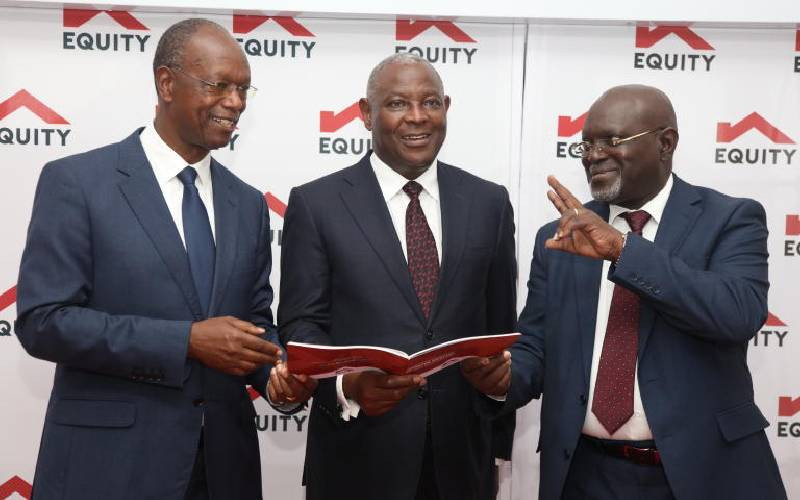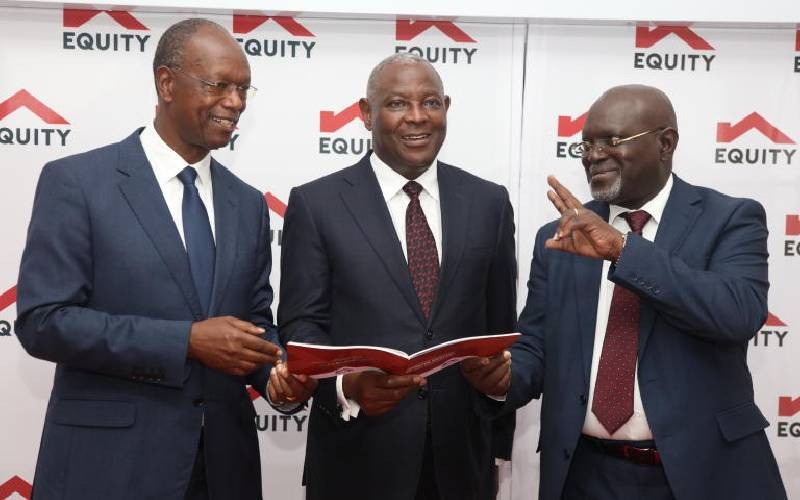
From left: Equity Group Non-Executive Chairman Isaac Macharia, CEO James Mwangi, and Equity BCDC Non-Executive Chairman Meti Mabanza, during the Q3 2025 investor briefing in Nairobi, on October 30, 2025. [Wilberforce Okwiri, Standard]
Kenya’s largest bank by customers Equity Group has reported a 32.66 per cent surge in its third-quarter net profit, which climbed from Sh39.2 billion in the previous year to Sh52.1 billion, powered predominantly by its thriving regional subsidiaries.
The performance, which offers a ray of hope for the broader financial sector and the larger Kenyan economy amid a corporate slowdown marked by losses in key sectors, was anchored on a 10 per cent growth in total operating income, which rose from Sh141.7 billion to Sh156.2 billion.
This was driven by a 16 per cent jump in net interest income to Sh93.5 billion and a three per cent rise in non-funded income to Sh62.6 billion.
On Thursday, the Equity Group chief executive James Mwangi said the performance marked a successful culmination of the lender's five-year transformational shift from a Kenyan-focused bank to a pan-regional financial group.
He disclosed that 49 per cent of the group's banking revenue came from outside Kenya.
Alongside Kenya, these subsidiaries operate in Uganda, Tanzania, Rwanda, South Sudan, and the Democratic Republic of Congo.
In an effort to mitigate the impact of the economic slowdown in Kenya, local banks including Equity have been actively expanding into foreign markets in East and Central Africa.
“The race has been won, the subsidiaries in the region are bigger than Kenya,” Mwangi said during a briefing with investors in Nairobi yesterday.
“We are no longer a Kenyan bank, we are a regional bank. We have more business outside Kenya than we have in Kenya.”
This strategic expansion has effectively insulated Equity Group from headwinds in the local market.
Analysts say as the first major lender to release third-quarter results, Equity's strong performance, fuelled by its regional strategy, sets a positive tone for the local banking sector that is confronting economic slowdown and a crisis of non performing loans.
Mwangi painted a stark picture of the financial challenges in Kenya, where customer appetite for loans has waned.
“The balance sheet in Kenya is not growing. This reflects the market,” he explained.
Stay informed. Subscribe to our newsletter
“The market is going through a very difficult environment, customers are not borrowing, our loans are going down, deposits are not significantly growing. It’s a flat, declining balance sheet.”
He noted that while Equity's lending in Kenya stands at Sh400 billion, the bank is holding an additional Sh600 billion in cash, a ready war chest for when the market recovers.
“I want to appeal to Kenyans that we understand the environment. But the most striking thing is despite that challenge, Kenya is improving the quality of its loan book,” Mwangi added.
The regional subsidiaries helped lift Equity’s overall performance.
In the Democratic Republic of Congo, profit after tax grew by 21 per cent to Sh13.8 billion while in Tanzania, profit after tax nearly doubled, soaring by 88 per cent to Sh1.5 billion.
The local subsidiary, Equity Bank Kenya, equally posted a 51 per cent growth in profit after tax to Sh31.1 billion, defying the economic tough climate.
Mwangi said the group's diversification into non-banking businesses is also bearing fruit.
Its technology and insurance segments increased their contribution to total revenue from 2.8 per cent to three per cent.
“The last five years we have focussed on transforming ourselves. Equity is no longer a Kenyan bank, it is a financial group,” the CEO said.
Equity gross non performing loans jumped to Sh129.1 billion in the nine month’s period from Sh125.3 billion in a similar period a year prior.
More banks are expected to publish their third quarter results in the next few days.

